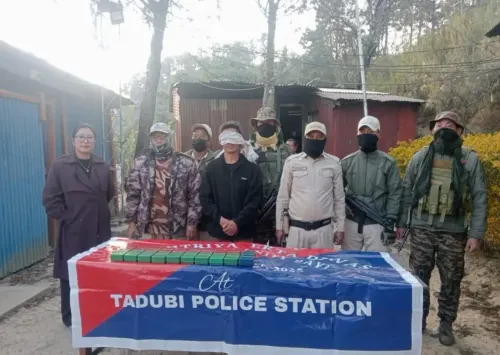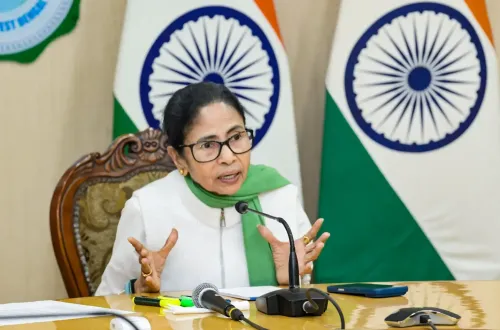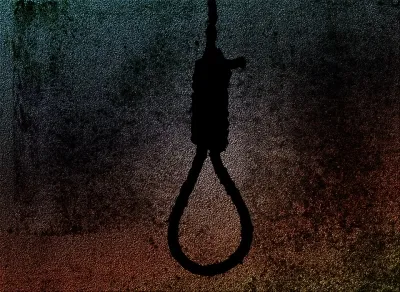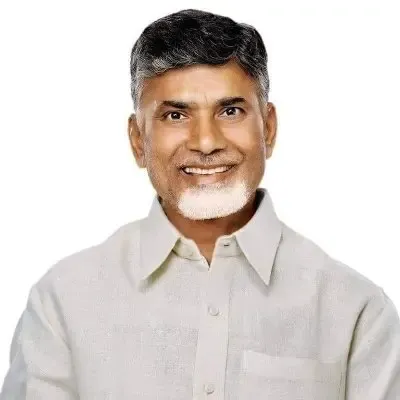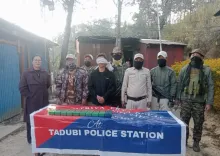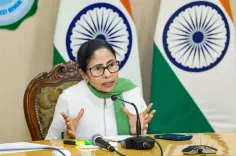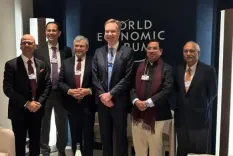Why Did Uddhav Sena Criticize Shinde MP Milind Deora Over Protest Restrictions in South Mumbai?
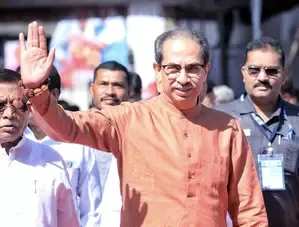
Synopsis
Key Takeaways
- Uddhav Sena demands expulsion of MP Milind Deora.
- Concerns over restricting protests in Mumbai.
- Emphasis on Marathi identity and rights.
- Historical context of protests in South Mumbai.
- Comparison with global protest movements.
Mumbai, Sep 5 (NationPress) The Shiv Sena (Uddhav Balasaheb Thackeray) vehemently criticized Shiv Sena (Shinde faction) MP Milind Deora on Friday, calling for his removal from the party. This demand arose after Deora urged Maharashtra's Deputy Chief Minister Devendra Fadnavis to create a standard operating procedure aimed at preventing the city from being disrupted during protests.
The city experienced significant turmoil following a five-day protest led by pro-Maratha quota activist Manoj Jarange-Patil, which brought Mumbai to a standstill. In response, Deora wrote to Fadnavis, advocating for a prohibition on protests within the city or their relocation from critical operational zones, which sparked outrage within the Uddhav Sena.
In a scathing editorial published in the party's mouthpiece Saamana, the Uddhav Sena declared, “The initial claim over Mumbai belongs to the Marathi community. The party of Deputy Chief Minister Eknath Shinde takes orders from Amit Shah. Hence, the Shinde faction MP does not recognize the Marathi people's rights to Mumbai. This city has remained resilient even after devastating bomb blasts; such is its spirit. It will not falter due to protests either, yet industrialists aligned with Modi and Shah are attempting to seize control of Mumbai, which raises serious alarms. While Mumbai may appear to belong to the wealthy, it is, fundamentally, the capital of Maharashtra.
The Uddhav Sena has demanded that Shinde expel Deora immediately, accusing him of disrespecting Marathi identity and opposing the Maratha community's movement as well as the assembly of Marathi people in Mumbai.
“The fight for a united Maharashtra ignited in South Mumbai. This region witnessed the marches of the Marathi populace. Most of the 106 martyrs fell victim to police violence in this very area, where their memorial stands today. It was in South Mumbai that Mahatma Gandhi called for the 'Quit India' movement against the British. The labor and dedication of Marathi workers and mill laborers built the wealth that adorned this area with grand palaces. Yet, Shinde Sena MP Deora has the audacity to assert that Marathi citizens should be barred from protesting in South Mumbai. He further suggests that the economic capital of the country must not be impeded by any agitation,” the editorial criticized.
The Uddhav Sena emphasized that young men and women from various villages across Maharashtra participated in Jarange-Patil’s protest for Maratha reservation. For several days, they traversed the city, gathering along the seafront, consuming the chutney and bread they brought from home while resting by the roadside. The affluent residents of South Mumbai have since raised their objections, leading their representative, Deora, to lodge a complaint with the Chief Minister against the agitation.
“Deora expressed that no further protests should be permitted around Mantralaya in South Mumbai. As an MP from the Shinde faction, backed by Amit Shah, he has openly opposed the Marathi people's protests in South Mumbai,” the Thackeray camp claimed.
The Uddhav faction dismissed Deora’s assertion that such protests are prohibited in all major capitals, labeling the statement as completely unacceptable.
“In America, citizens took to the streets against President Trump’s administration, with demonstrations occurring in over 1,600 locations. Chicago, a key commercial hub, became the focal point of protests. Marches also took place in Atlanta, St. Louis, California, Maryland, New York, and Washington. Supporters of President Trump even resorted to violence within the Capitol Hill building, a long-standing symbol of American democracy. Protests are also a common occurrence across Europe. The right to protest in a capital city is a fundamental entitlement bestowed upon citizens in a democracy,” the editorial stated.
“Claiming that Marathi citizens should not protest in Mumbai, especially in South Mumbai where the affluent reside, is an injustice to all Marathi brothers,” it concluded.


